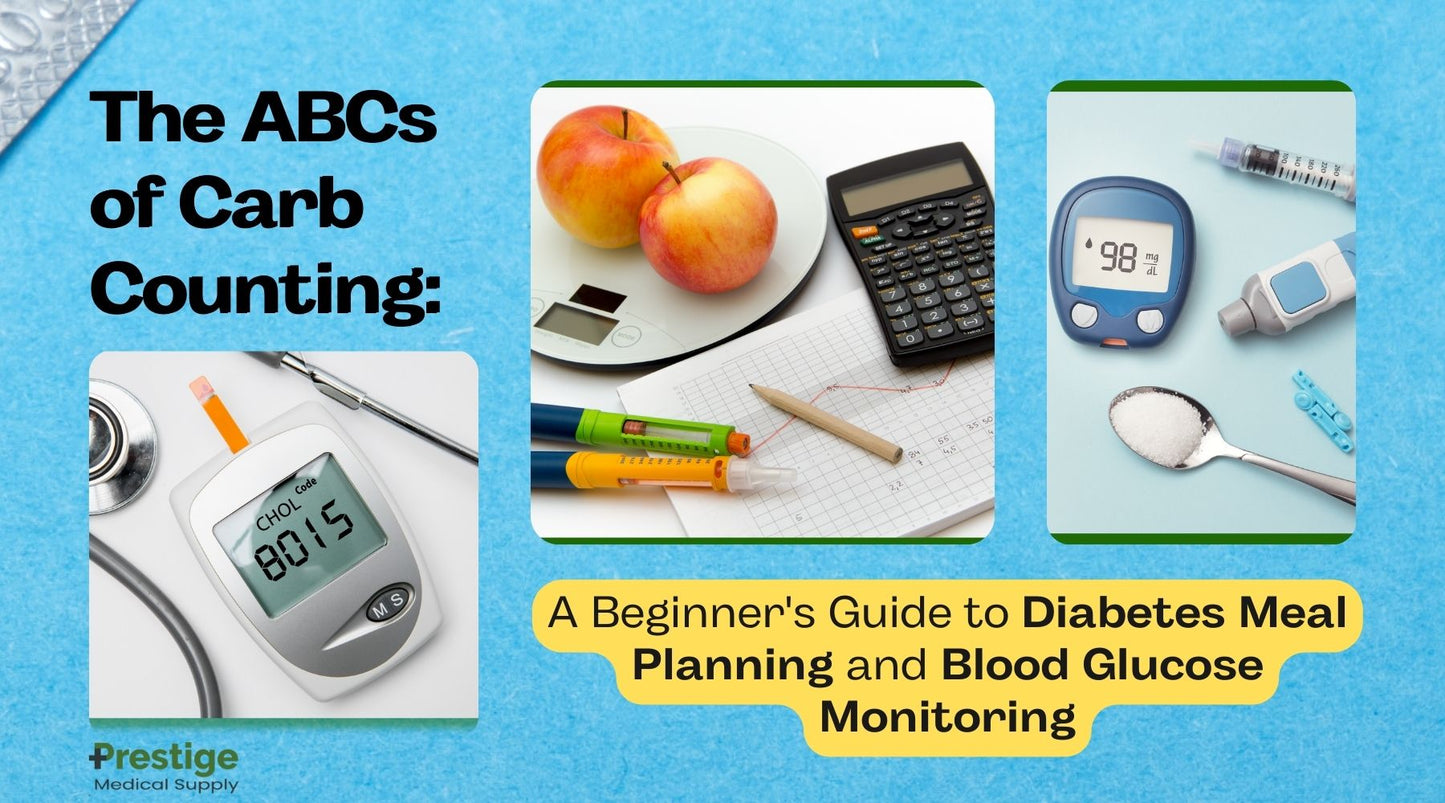
What You Should Know About Diabetics & Meal Planning
Living with diabetes requires careful management of blood sugar levels, and one essential aspect of this is carb counting. For individuals new to diabetes meal planning and blood glucose monitoring, understanding how different foods affect blood sugar and having the necessary supplies can seem daunting. This beginner's guide aims to simplify the process and provide practical tips to help individuals take control of their diabetes through effective meal planning and monitoring with the right supplies.What is Diabetes?
Diabetes is a chronic condition characterized by high levels of sugar (glucose) in the blood. It occurs when the body either doesn't produce enough insulin (a hormone that regulates blood sugar) or cannot effectively use the insulin it produces. There are different types of diabetes, with type 2 diabetes being the most common.The Importance of Carb Counting
Carbohydrates, or carbs, have a direct impact on blood sugar levels. By counting carbs using tools like One Touch Ultra test strips, individuals with diabetes can manage their blood sugar levels more effectively. Carb counting allows for better meal planning and helps individuals make informed choices about the foods they consume.Understanding Carbohydrates
Carbohydrates are one of the three main macronutrients, along with proteins and fats. They provide the body with energy. Carbs are found in various foods, including grains, fruits, vegetables, dairy products, and sugary treats. It's important to differentiate between simple carbs (found in refined sugars) and complex carbs (found in whole grains and vegetables).How Carbs Affect Blood Sugar
When consumed, carbs are broken down into glucose, which enters the bloodstream. This leads to a rise in blood sugar levels. In individuals with diabetes, this process is impaired, resulting in higher blood sugar levels. By understanding how different carbs affect blood sugar, individuals can make appropriate food choices and adjust insulin dosage if necessary, using tools like Dexcom G6 Sensors and FreeStyle Libre 14 glucose sensors.The Role of Carb Counting in Diabetes Meal Planning
Carb counting is a crucial component of diabetes meal planning. By knowing the number of carbs in a meal, individuals can match their insulin dosage accordingly, preventing blood sugar spikes or drops. It allows for better glycemic control and helps individuals achieve their target blood sugar levels. Having the right blood glucose monitoring system supplies and glucose monitor supplies is essential for accurate monitoring.Tools for Carb Counting and Blood Glucose Monitoring
There are several tools available to simplify the process of carb counting and blood glucose monitoring. These include carbohydrate counting apps, food scales, measuring cups, and reference books with carb content. Additionally, having the necessary supplies like One Touch Ultra test strips, Dexcom G6 Sensors, and FreeStyle Libre 14 glucose sensors ensures accurate monitoring and measurement of blood sugar levels.Step-by-Step Guide to Carb Counting and Blood Glucose Monitoring To effectively count carbs and monitor blood glucose levels, follow these steps:
-
Reading Food Labels: Use tools like One Touch Ultra test strips to read the nutritional information on food labels to determine the total carbohydrate content per serving. Pay attention to serving sizes and adjust accordingly.
-
Estimating Portion Sizes: When nutritional information is not readily available, estimate the portion sizes and use reference materials to determine the carb content. Over time, estimation becomes more accurate with practice.
-
Keeping a Food Diary: Maintain a food diary to track the foods consumed and their corresponding carb counts. This helps identify patterns, make adjustments, and provides a record for healthcare professionals to review.
-
Adjusting Insulin Dosage: Work with a healthcare professional to determine the appropriate insulin dosage based on carb counts and blood sugar levels. Regular monitoring and adjustments, using tools like Dexcom G6 Sensors, are crucial for maintaining optimal glycemic control.
Meal Planning Tips for Diabetes: Effective meal planning for diabetes involves making healthy food choices. Consider the following tips:
a. Healthy Carb Choices: Opt for complex carbs found in whole grains, legumes, fruits, and vegetables. These provide essential nutrients, fiber, and are digested more slowly, preventing rapid blood sugar spikes.
b. Sample Meal Plan: Here's an example of a balanced diabetes meal plan:
| Breakfast | Whole grain oatmeal with berries and a side of Greek yogurt. |
| Snack | Carrot sticks with hummus. |
| Lunch | Grilled chicken breast with quinoa and steamed vegetables. |
| Snack | Apple slices with peanut butter. |
| Dinner | Baked salmon with brown rice and roasted asparagus. |
| Snack | Mixed nuts. |
Remember to tailor meal plans to individual preferences and dietary requirements.
Conclusion
Carb counting and blood glucose monitoring are indispensable skills for individuals with diabetes. By understanding how different carbohydrates affect blood sugar levels, individuals can make informed choices, better manage their diabetes through effective meal planning, and monitor their blood glucose levels accurately. Remember to consult with healthcare professionals, use tools like Dexcom G6 Sensors, FreeStyle Libre 14 glucose sensors, and have the necessary supplies like One Touch Ultra test strips and glucose monitor supplies for successful management.FAQs
1 - Is carb counting only necessary for people with diabetes?Carb counting is especially crucial for individuals with diabetes, as it helps them manage their blood sugar levels. However, anyone can benefit from being mindful of their carbohydrate intake for overall health and balanced nutrition.
2 - How accurate are food labels for carb counting?
Food labels provide valuable information about the carbohydrate content of packaged foods. While they are generally reliable, it's essential to be aware of serving sizes and adjust accordingly, using tools like One Touch Ultra test strips.
3 - Can I still enjoy my favorite foods while carb counting?
Absolutely! Carb counting doesn't mean giving up your favorite foods. It's about understanding portion sizes and making informed choices to maintain blood sugar control.
4 - Should I consult a healthcare professional before starting carb counting?
It's highly recommended to consult with a healthcare professional, such as a registered dietitian or diabetes educator, to receive personalized guidance and support when starting carb counting and blood glucose monitoring.
5 - Can carb counting help with weight management?
Carb counting can be beneficial for weight management as well. By tracking carb intake and making healthier choices, individuals can achieve better portion control and maintain a balanced diet.
